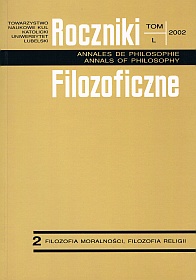The Humanism of Despair as a Result of the Death of God in Contemporary Culture
Abstract
The philosophy of the death of God, pronounced by Friedrich Nietzsche in 1882, resulted in many negative consequences experienced in contemporary culture. The Nietzschean critique of the classical hierarchy of values inspired radical declaration about the death of metaphysics and the end of human history. In its form developed in deconstructive postmodernism, this philosophy proclaims the dissolution of the human subject. Consistently, it rejects the very concept of human person and tries to reduce human existence to the level of psychoanalytic, social and/or cultural phenomena. In this conceptual framework, either the classical version of humanism must be questioned or its nihilistic reinterpretation, in terms of a humanism of despair, should be adopted.
References
Baudrillard J.: Agonie des Realen, Berlin: Merve 1978.
Cioran E. M.: Z nie wydanych zeszytów, „Zeszyty Literackie”, 16(1998), nr 3 (63), s.56-62.
Deleuze G.: Różnica i powtórzenie, „Colloquia Communia”, 1988, nr1-3 (36-38), s.191-220.
Derrida J.: Marges de la philosophie, Paris: Les Éd. de Minuit 1972.
Derrida J.: De la grammatologie, Paris: Les Éd. de Minuit 1967.
Filozofia pasożytuje na wyobraźni poetyckiej. Rozmowa z Richardem Rortym, [w:] B. Wildstein, Profile wieku, Warszawa: Politeja 2000, s.145-156.
Friedrich von Hayek. Liberałowie muszą być liderami, [w:] G. Sorman, Prawdziwi myśliciele naszych czasów, tł. M. Miszalski, Warszawa: „Czytelnik” 1993, s. 249-258.
Jan Paweł II: Przemówienie w siedzibie UNESCO, Paryż, 2 czerwca 1980, [w:] Przemówienia i homilie Ojca Świętego Jana Pawła II, Kraków: Wydawnictwo Znak 1997, s.267-286.
Kostyrko T. (red.): Dokąd zmierza współczesna humanistyka?, Warszawa: Instytut Kultury 1994.
Lang C. Y. (ed.): The Swinburne Letters, vol. II, New York: AMS Press 1972.
Lyotard J. F.: Postmodernizm dla dzieci. Korespondencja 1982-1985, tł. J. Migasiński, Warszawa: Fundacja Aletheia 1998.
Payne R.: Marx, New York: Simon and Schuster 1968.
Poster M.: Sartre's Marxism, Cambridge: Cambridge University Press 1982.
Sartre J.-P.: Critique de la raison dialectique (précédé de Question de méthode), t. I: Théorie des ensembles pratiques, Paris: Libraire Gallimard 1960.
Sartre J.-P.: Self-portrait at Seventy, [w:] tenże, Life/Situations: Essays Written and Spoken, transl. P. Auster, L. Davis, New York: Pantheon Books 1977.
Singer P.: Re-thinking Life and Death: The Collapse of Our Traditional Ethics, New York: St. Martin's Press 1994.
Sloterdijk P.: Critique of Cynical Reason, London: Verso 1988.
Szahaj A.: Jean Baudrillard − między rozpaczą a ironią, „Kultura Współczesna”, 2(1994), nr1 (3), s.19-29.
Świerkocki M.: Derrida jako postmodernistyczny pismak czyli doskonałość niedoskonałości, [w:] Derridiana, wybrał i oprac. B. Banasiak, Kraków: Inter Esse 1994, s.137-145.
Vonnegut K., Jr.: Wampeters, Foma and Granfalloons, New York: Delta Books 1974.
Weigel G.: Prawda i wolność: konsekwencje dla demokracji, „Ethos”, 12(1999), nr 1-2 (45-46), s.323-341.
Wellek R.: Czy kres literaturoznawstwa?, „Pamiętnik Literacki”, 77(1986), z.2, s.319-330.
Wilson A. N.: God's Funeral: A Biography of Faith and Doubt in Western Civilization, New York: Balantine Books 1999.
Życiński J.: Europejska wspólnota ducha, Warszawa: ATK 1998.
Copyright (c) 2002 Roczniki Filozoficzne

This work is licensed under a Creative Commons Attribution-NonCommercial-NoDerivatives 4.0 International License.





